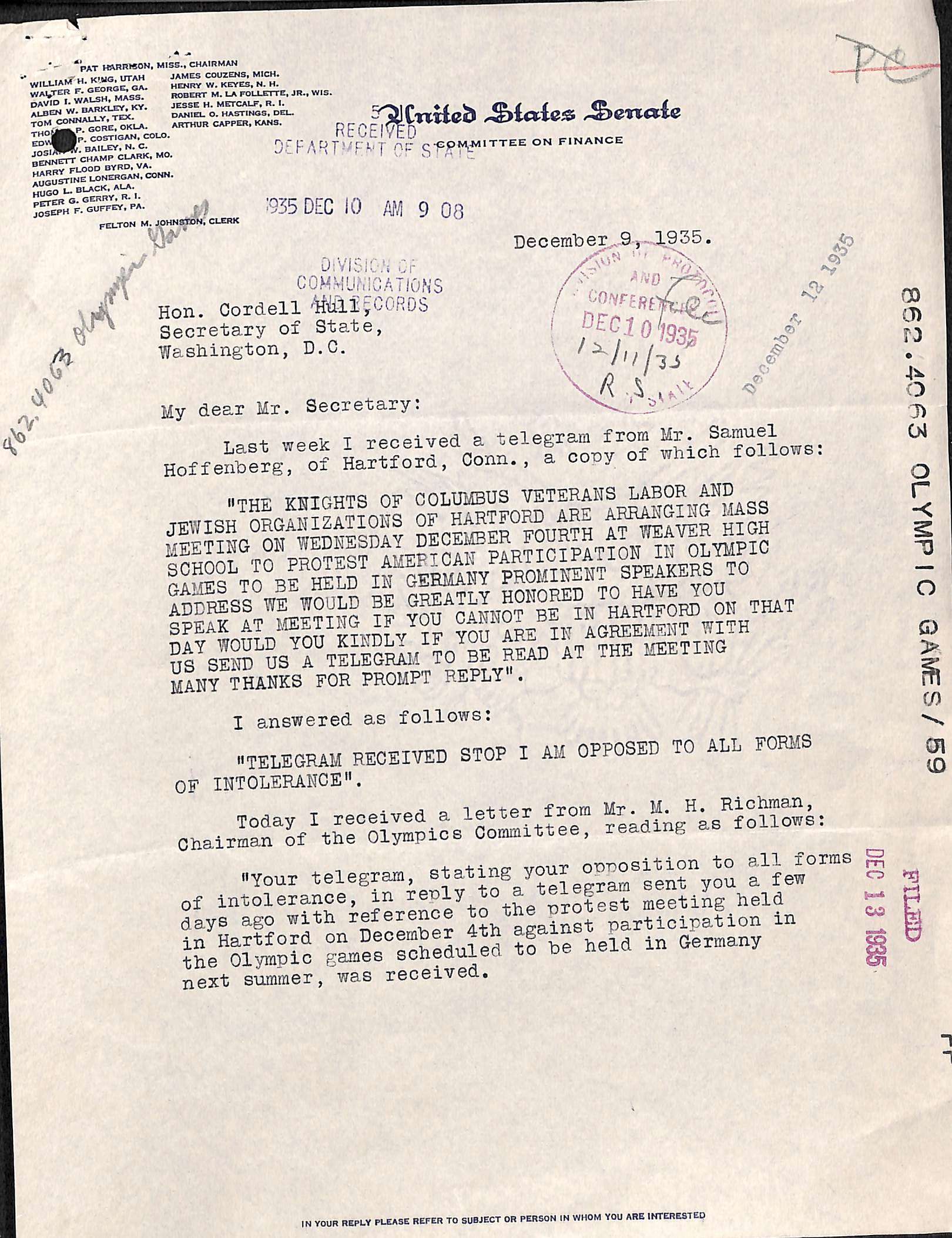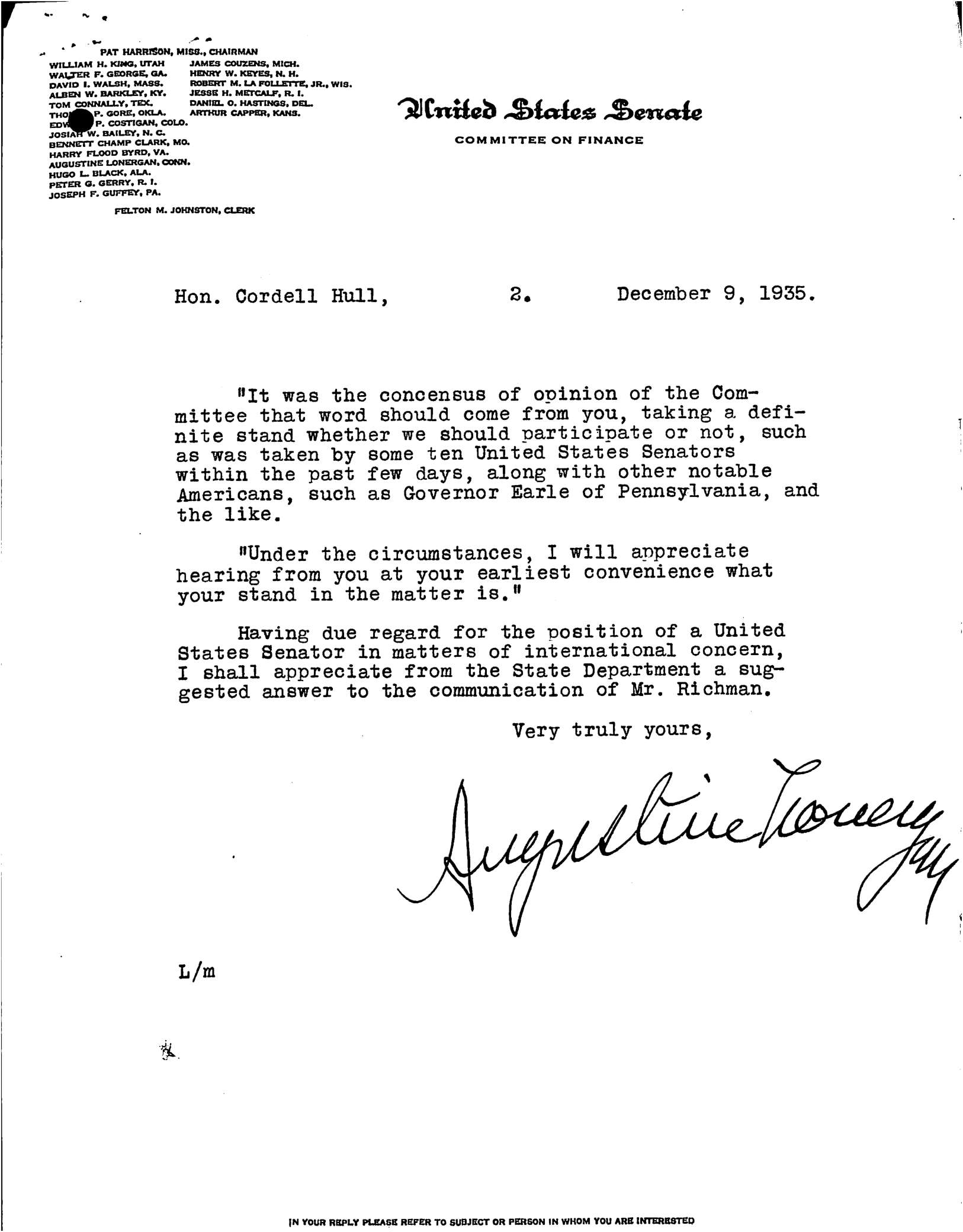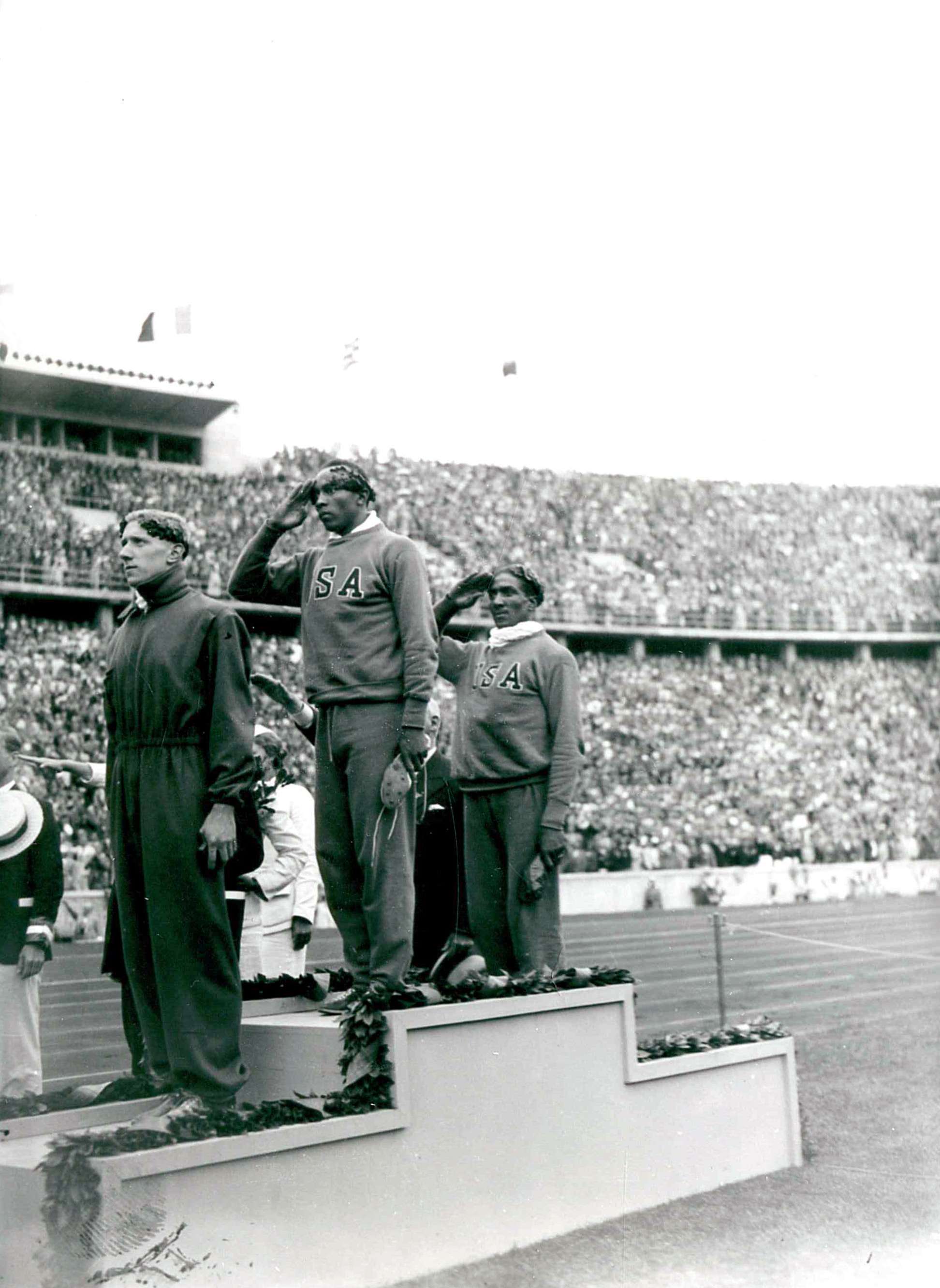The 1936 Olympics and the Boycott Movement
Weighing the Evidence
All documents and text associated with this activity are printed below, followed by a worksheet for student responses.Introduction
In 1931 Germany was awarded the Summer Olympic games to be held in Berlin in August 1936. Two years later, Adolf Hitler and the Nazi party were elected and quickly enacted laws depriving Jews, Roma, homosexuals and other "inferior" groups of their rights to participate in German government, industry, and society. In 1935, the Nazi government enacted the Nuremberg laws, which prohibited marriage between German Jews and Aryans, and the laws declared that Jews were no longer German citizens.
As early as 1933 many people around the world called on the International Olympic Committee to boycott the Berlin games, since Nazi policies violated the Olympic ideals of sportsmanship and fair play. Meetings were held by the American Olympic organizations -- the Amateur Athletic Union and the American Olympic Committee -- and citizens wrote letters to the U.S. government for and against an American boycott.
In this activity you will study the artifacts and decide whether the U.S. government should have supported a boycott of the Berlin games. These artifacts come from the collections of the National Archives and the United States Holocaust Memorial Museum.
Name:
Class:
Class:
Worksheet
The 1936 Olympics and the Boycott Movement
Weighing the Evidence
Examine the documents and text included in this activity. Consider how each document does or does not support two opposing interpretations or conclusions. Fill in the topic or interpretations if they are not provided. To show how the documents support the different interpretations, enter the corresponding document number into the boxes near the interpretation. Write your conclusion response in the space provided. Interpretation 1
The United States should have boycotted the Berlin Olympics as a protest over German policies against Jews.
The United States should have boycotted the Berlin Olympics as a protest over German policies against Jews.
Should the United States have boycotted the 1936 Berlin Olympics?
Interpretation 2
The United States government was right not to bring politics into the Olympic games.
The United States government was right not to bring politics into the Olympic games.
1
Activity Element
Correspondence from George Messersmith to Secretary of State Cordell Hull about 1936 Olympics
Page 1

2
Activity Element
Letter from Aaron Gamsey to President Roosevelt about 1936 Olympics
Page 1

3
Activity Element
Correspondence between Senator Lonergan and Secretary of State Cordell Hull about 1936 Olympics
Page 1

4
Activity Element
Boycott 1936 Olympics
Page 1

5
Activity Element
Letter from Samuel Rosenman to President Franklin Roosevelt about C.H. Sherill
Page 1

6
Activity Element
Jesse Owens at the 1936 Olympics in Berlin, Germany
Page 1

7
Activity Element
American Institute of Public Opinion Poll, March 23, 1935 (USHMM)

Conclusion
The 1936 Olympics and the Boycott Movement
Weighing the Evidence
Based on your findings, consider the following.
The United States did send a team to the 1936 Berlin Olympics. While the success of African American sprinter Jesse Owens during the games contradicted the Nazi regime's stance of white supremacy, many viewed the Olympics as a huge propaganda win for Germany. The Roosevelt administration remained steadfast in its determination that the Olympics were about sports, not politics.
- Do you agree with the Roosevelt administration that U.S. participation in the Olympic Games has no connection to politics? Or is a country’s participation in another country’s event an implicit endorsement of their internal politics? Explain.
Your Response
Document
Correspondence from George Messersmith to Secretary of State Cordell Hull about 1936 Olympics
11/15/1935
This primary source comes from the General Records of the Department of State.
Full Citation: Correspondence from George Messersmith to Secretary of State Cordell Hull about 1936 Olympics; 11/15/1935; 862.4063; Central Decimal Files, 1910–1963; General Records of the Department of State, ; National Archives at College Park, College Park, MD. [Online Version, https://docsteach.org/documents/document/george-messersmith-cordell-hull-1936-olympics-11-15-1935, May 10, 2024]Correspondence from George Messersmith to Secretary of State Cordell Hull about 1936 Olympics
Page 1

Correspondence from George Messersmith to Secretary of State Cordell Hull about 1936 Olympics
Page 2

Correspondence from George Messersmith to Secretary of State Cordell Hull about 1936 Olympics
Page 3

Correspondence from George Messersmith to Secretary of State Cordell Hull about 1936 Olympics
Page 4

Correspondence from George Messersmith to Secretary of State Cordell Hull about 1936 Olympics
Page 5

Correspondence from George Messersmith to Secretary of State Cordell Hull about 1936 Olympics
Page 6

Correspondence from George Messersmith to Secretary of State Cordell Hull about 1936 Olympics
Page 7

Correspondence from George Messersmith to Secretary of State Cordell Hull about 1936 Olympics
Page 8

Correspondence from George Messersmith to Secretary of State Cordell Hull about 1936 Olympics
Page 9

Correspondence from George Messersmith to Secretary of State Cordell Hull about 1936 Olympics
Page 10

Correspondence from George Messersmith to Secretary of State Cordell Hull about 1936 Olympics
Page 11

Correspondence from George Messersmith to Secretary of State Cordell Hull about 1936 Olympics
Page 12

Correspondence from George Messersmith to Secretary of State Cordell Hull about 1936 Olympics
Page 13

Correspondence from George Messersmith to Secretary of State Cordell Hull about 1936 Olympics
Page 14

Correspondence from George Messersmith to Secretary of State Cordell Hull about 1936 Olympics
Page 15

Correspondence from George Messersmith to Secretary of State Cordell Hull about 1936 Olympics
Page 16

Correspondence from George Messersmith to Secretary of State Cordell Hull about 1936 Olympics
Page 17

Correspondence from George Messersmith to Secretary of State Cordell Hull about 1936 Olympics
Page 18

Document
Letter from Aaron Gamsey to President Roosevelt about 1936 Olympics
9/26/1935
This primary source comes from the General Records of the Department of State.
Full Citation: Letter from Aaron Gamsey to President Roosevelt about 1936 Olympics; 9/26/1935; 862.4063; Central Decimal Files, 1910–1963; General Records of the Department of State, ; National Archives at College Park, College Park, MD. [Online Version, https://docsteach.org/documents/document/letter-aaron-gamsey-president-roosevelt-1936-olympics-9-26-1935, May 10, 2024]Letter from Aaron Gamsey to President Roosevelt about 1936 Olympics
Page 1

Letter from Aaron Gamsey to President Roosevelt about 1936 Olympics
Page 2

Document
Correspondence between Senator Lonergan and Secretary of State Cordell Hull about 1936 Olympics
12/9/1935
This primary source comes from the General Records of the Department of State.
Full Citation: Correspondence between Senator Lonergan and Secretary of State Cordell Hull about 1936 Olympics ; 12/9/1935; 862.4063; Central Decimal Files, 1910–1963; General Records of the Department of State, ; National Archives at College Park, College Park, MD. [Online Version, https://docsteach.org/documents/document/correspondence-senator-lonergan-cordell-hull-1936-olympics, May 10, 2024]Correspondence between Senator Lonergan and Secretary of State Cordell Hull about 1936 Olympics
Page 1

Correspondence between Senator Lonergan and Secretary of State Cordell Hull about 1936 Olympics
Page 2

Correspondence between Senator Lonergan and Secretary of State Cordell Hull about 1936 Olympics
Page 3

Document
Boycott 1936 Olympics
ca. 1936
This primary source comes from the Records of the Office of Alien Property.
National Archives Identifier: 532609
Full Citation: 131-NO-43-10; Boycott 1936 Olympics; ca. 1936; Propaganda Photographs of Nazi Personalities and Activities in Germany and other Countries, 1933–1941; Records of the Office of Alien Property, ; National Archives at College Park, College Park, MD. [Online Version, https://docsteach.org/documents/document/boycott-1936-olympics-signs, May 10, 2024]Boycott 1936 Olympics
Page 1

Document
Letter from Samuel Rosenman to President Franklin Roosevelt about C.H. Sherill
12/22/1933
This primary source comes from the Collection FDR-FDRPOF: President's Official Files (Roosevelt Administration).
National Archives Identifier: 2780752
Full Citation: Letter from Samuel Rosenman to President Franklin Roosevelt about C.H. Sherill; 12/22/1933; OF 757: Sherrill, Brigadier General C. H. 1933-1935; Franklin D. Roosevelt President's Official Files, 1933–1945; Collection FDR-FDRPOF: President's Official Files (Roosevelt Administration), ; Franklin D. Roosevelt Library, Hyde Park, NY. [Online Version, https://docsteach.org/documents/document/letter-rosenman-fdr-sherill, May 10, 2024]Letter from Samuel Rosenman to President Franklin Roosevelt about C.H. Sherill
Page 1

Document
Jesse Owens at the 1936 Olympics in Berlin, Germany
8/1936
This photograph shows Jesse Owens representing the United States in gold-medal position on top of the podium at the 1936 Olympics in Berlin, Germany. Owens won four gold medals during the games in track and field. His performance was widely considered a blow to the Nazi belief in Aryan supremacy.
This image comes from a series of photographs taken by Germany during the Berlin Olympics that were seized following World War II.
This image comes from a series of photographs taken by Germany during the Berlin Olympics that were seized following World War II.
This primary source comes from the National Archives Collection of Foreign Records Seized.
National Archives Identifier: 148728024
Full Citation: Photograph 242-HD-171a-1; Jesse Owens at the 1936 Olympics in Berlin, Germany; 8/1936; Summer Olympic Games, Berlin, 8/1936 - 8/1936; National Archives Collection of Foreign Records Seized, ; National Archives at College Park, College Park, MD. [Online Version, https://docsteach.org/documents/document/owens-podium-olympics, May 10, 2024]Jesse Owens at the 1936 Olympics in Berlin, Germany
Page 1

